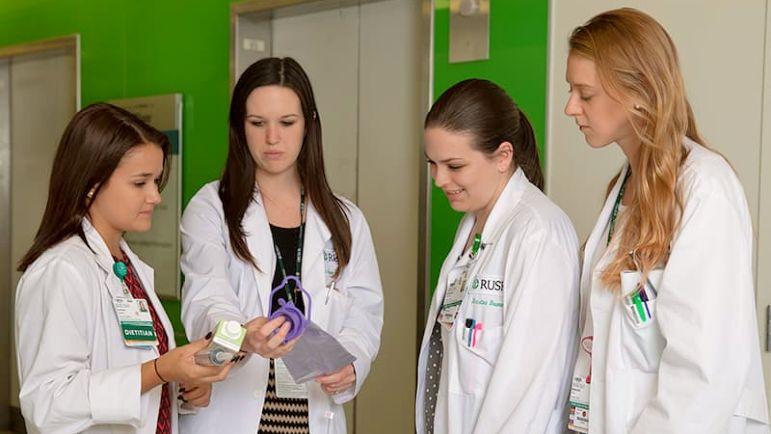Are eggs good for you? Is bread a nutrition villain? What about eggs on bread … or bread on eggs?
There are all sorts of scrambled, half-baked nutrition information out there these days. Clinical nutritionists cut through the noise and break down the most recent peer-reviewed research to help people develop eating habits that allow them to feel their best and manage diseases.
If that sounds like your cup of tea and you want to learn more about careers in clinical nutrition, let’s get cooking.
What is clinical nutrition?
What we consume profoundly affects our bodies and their ability to operate at peak performance. Besides serving as a preventative measure against illness, the proper application of nutrition can be instrumental in enhancing recovery and healing in a range of situations, including medical intervention.
Clinical nutrition is the prevention, diagnosis, and treatment of chronic diseases and conditions leveraging the power of nutrition. It’s the study of how food can be used to improve patient outcomes at all stages of their health and medical journey. Clinical nutrition is the practice of determining if a person is receiving proper nutrition based on a host of data points such as family and medical history, lifestyle, medical testing, and underlying conditions.
What is the role of a clinical nutritionist?
Clinical nutritionists help patients address their health concerns by formulating nutrition and lifestyle strategies tailored to their needs and goals. Their job isn’t isolated to prevention either. Clinical nutritionists will often collaborate with doctors, specialists, and caregivers to craft a nutrition and lifestyle plan that complements other treatments.
Specialists keep current on the latest advances in nutrition science and translate them into an easily digestible message to help people, or even entire populations, get healthier. They help prevent and treat chronic diseases — such as obesity, heart disease and diabetes — in a variety of settings, from health care clinics and schools to at-home consultation.
Technically, anyone who wants to give nutrition advice can call themselves a nutritionist. For example, many personal trainers market themselves as nutritionists because they give clients diet advice.
Certified clinical nutrition specialists and dietitians, meanwhile, earn degrees, complete internships and obtain licenses that ensure they have the training to make use of the most credible, evidence-based research. These qualifications enable them to manage patients and collaborate with medical professionals on their approach to care.
The demand for clinical nutritionists has grown considerably over the last few years. Many of them can be seen working in private practices, hospitals, acute care centers and even government agencies. Their rich educational preparation and training makes them fit to be employed in various settings that use nutrition to manage individual and population health.
How to become a clinical nutritionist or clinical dietitian
If you are considering becoming a clinical nutritionist or clinical dietitian, let’s break down the steps you will need to take to enter the world of science-based optimal performance and nutrition.
How do you become a clinical nutritionist?
Keep in mind that the path to becoming a clinical nutritionist builds on top of the foundation of the previous part of the process. Let’s take a closer look at the steps it takes to become a clinical nutritionist.
Complete your undergraduate studies
Depending on your chosen educational institute, this will require a portion of your credit hours related to biosciences. You’ll want to ask plenty of questions and get with a guidance counselor to ensure you are taking the required courses to get into your graduate program, which brings us to the next step in your journey.
Clinical Nutritionists: Earn a Master of Science Clinical Nutrition
Most will be able to complete their MS in Clinical Nutrition in as little as two years. Be sure you are in an accredited program that qualifies you to sit for certifications after graduation. This process will also include a minimum number of supervised practice experience. Although the experience of learning will be rewarding, this is all to prepare you for the real work ahead, earning your certifications.
Acquire the required certifications
You’ll need to earn the right to practice as a clinical nutritionist or dietitian. If you graduated from an accredited, recognized program and completed your practice hours, you will likely have all the prerequisites to sit for your certification. Certifications may include:
- Certified Nutrition Specialist (CNS)
- Certified Clinical Nutritionist (CCN)
- Diplomate of the American Clinical Board of Nutrition (DACBN)
- Diplomate of the Chiropractic Board of Clinical Nutrition (DCBCN)
Each certification has unique requirements and a baseline of knowledge. The cost of testing can be expensive so do your best to be well prepared.
How do you become a clinical dietitian?
Although there are major similarities between the two careers, the road to becoming a clinical nutritionist varies slightly. Undergraduate studies are similar. It’s important to include biosciences as part of your curriculum.
Join an Accredited ACEND Internship Program
This is where the path of a clinical dietitian deviates slightly. Rather than a graduate degree program, dietitians enter a rigorous internship program that exposes them to up to 1,200 hours of dietetic studies. You’ll need to take an exit exam before you can sit for the Registration Examination for Dietitians.
Acquire Specialty Certifications
Just like a clinical nutritionist, clinical dietitians have the opportunity to sit for various certifications that give them the right to practice different disciplines and specializations within their field. Certifications include:
- Geriatric
- Pediatric nutrition
- Sports dietetics
- Obesity and weight management
- Pediatric critical care nutrition
The proper training and credentials set students up to work in a variety of careers, such as federal or state agencies, public health or wellness settings, private industry, research, or academic settings.
How long does it take to become a clinical nutritionist?
The short answer is it depends. The amount of time it takes to become a clinical nutritionist varies based on each person’s unique situation. Some may be able to take on a considerable amount of credit hours per semester while others will need to lessen their workload to balance family and work schedules.
To sit for your certifications, you’ll need to acquire a Master of Science in Clinical Nutrition and have a certain number of supervised practices. To qualify for this master’s program, you will need to make sure that your undergraduate course work contains the following:
- At least one course in biochemistry
- At least one course in physiology
- At least one course in nutrition
- At least one course in statistics
Factoring all of this, part-time students pursuing a Master’s in Clinical Nutrition generally graduate in three to five years. A full-time student pursuing a Master’s in Clinical Nutrition can usually complete a program in 18 months. Most master’s degree programs have a limit of around five years to finish the degree.
From there, graduates have the option of becoming a CNS, which requires 900 hours of supervised practice and passing an exam administered by the Board for Certification of Nutrition Specialists.
Starting in 2024, to become a registered dietitian nutritionist, or RDN, individuals must complete a master’s degree and 1,200 hours of supervised practice during a dietetic internship from an accredited institution listed with the Accreditation Council for Education in Nutrition and Dietetics. Successful completion of these requirements allows them to take the national registration exam from the Commission on Dietetic Registration.
Why consider pursuing a career in clinical nutrition
Competitive salary
The average annual salary of nutritionists and dietitians was $66,450 as of May 2022, according to the Bureau of Labor and Statistics. Salaries can vary greatly based on experience, location and specialty. The top 10 percent of earners in the field average more than $83,000 per year.
Embrace your interest in food
People are paying more attention to what they’re eating, where their food comes from and how food plays a crucial role in health. A career in nutrition allows people to turn their curiosity into a career that can help others. “Being interested in food or being exposed to a nutritionist or dietitian who gave you life-changing advice that made you feel better often drives someone to pursue a career in the field,” says Sarah Peterson, PhD, RD, LDN, acting director of the master’s in clinical nutrition program at RUSH University.
Strong job growth
The Bureau of Labor and Statistics estimates a 7 percent job growth for nutritionists and dietitians from 2022 to 2032, which outpaces most other occupations. Demand is increasing as baby boomers age and health care providers become more aware of the importance of nutrition in preventing and treating disease.
Help patients
Clinical nutrition specialists provide individual counseling and develop meal plans that can change lives and help patients who are dealing with diseases, such as diabetes, cardiovascular disease or obesity-related cancers.
Broad career opportunities
There is no shortage of opportunities when it comes to a career in clinical nutrition. Here are just some of the interesting ways they are utilized throughout the healthcare industry.
- Nutritionists work in health care settings ranging from large medical centers to community clinics and private practices.
- Food and nutrition management is needed in industry settings, where nutritionists help organizations meet food regulation standards. Nutritionists also participate in product development, and translate science for marketing, communications and sales departments.
- Public health nutritionists work in community settings such as government or schools, providing nutrition assessments for large populations and developing interventions to change policy and improve nutrition.
- Nutritionists often work as faculty in universities and colleges, where they teach and perform research.
- The media is employing nutritionists to keep pace with increasing public interest in food and nutrition. Nutritionists with strong communications skills help newspapers, magazines and broadcast media digest and publish the latest nutrition research.
Career outlook for clinical nutritionists
Please note, in this section we are referring exclusively to clinical nutritionists and clinical dietitians and not simply registered dietitians.
There is a difference between clinical nutritionists and registered dietitians. Clinical nutritionists carry the title of CNS which can only be earned through meeting all the requirements to pass the Board for Certification of Nutrition Specialists exam. Registered dietitians on the other hand, do not go through the same rigorous training or testing as clinical nutritionists and clinical dietitians and follow a different career trajectory.
Pursuing a career in clinical nutrition is an exciting prospect for many. After the recent global health crisis, more people have realized the value and importance of optimal health and nutrition.
However, recent events have also stressed the importance of having medical and health experts that are trained and operate from a firm, science-based wellness philosophy. It’s for this reason clinical nutritionists and dieticians have become so sought after.
The result is a very promising future. In fact, according to the U.S Bureau of Labor Statistics, job growth is projected to expand by 7% over the next ten years. This is faster than the average for all occupations in the United States. In terms of pay, the median salary for clinical nutritionists is pegged at $66,450 per year.
For those wondering, here’s a look at the types of nutritionists that get paid the highest annual salaries.
- Director Food Nutrition: $91,807 to $117,050
- Clinical Nutrition Manager: $63,224 to $79,180
- Remote Nutritionist: $65,050 to $78,468
- Nutrition Coordinator: $49,451 to $59,697
Ready to launch your career in clinical nutrition? Explore RUSH’s Clinical Nutrition Masters program and apply now.






